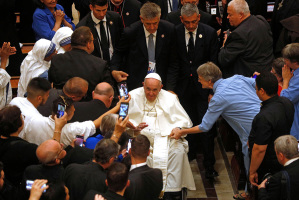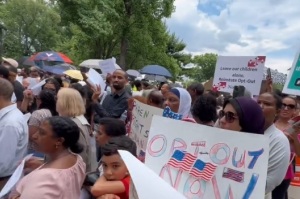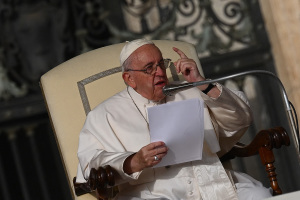Death Sentencing of Pakistani Christian for 'Blasphemy' Stirs Outrage
Pakistan's opposition parties protested and international human rights groups condemned the death penalty given to a Christian sanitation worker about a year after he was accused of blasphemy.
The Pakistan Tehreek-i-Insaf party and the Pakistan People's Party on Friday strongly protested in parliament the sentencing of 27-year-old Sawan Masih, who was convicted of insulting the Prophet Muhammad while conversing with a Muslim friend in the eastern Lahore city's Joseph Colony in March last year.
Ghulam Murtaza Chaudhry, additional session judge of Lahore, sentenced Masih to death Thursday, saying he "must be hanged and fined," Reuters quoted the lawyer of the accused, Nameem Shakir, as saying. The sentencing includes a fine of Rs.200,000 (roughly U.S. $2,050).
The sentence is not expected to be carried out any time soon as there is a de facto moratorium on the death penalty in Pakistan.
Masih, a father of three, will appeal the verdict, the lawyer said.
The U.K.-based Centre for Legal Aid, Assistance and Settlement plans to file an appeal Saturday "in the hope of getting the decision overturned soon."
Meanwhile, David Griffiths, Amnesty International's deputy Asia Pacific director, called the verdict "a travesty of justice."
"There are serious concerns about the fairness of his trial, and an argument between two friends is not a basis for sending anyone to the gallows. Sawan Masih must be released immediately and unconditionally," Griffiths said.
The judgment was delivered in a jail due to apprehensions of an attack on Masih, who denied the charges and said the accusations were made due to a property dispute.
CLAAS lawyers Naeem Shakir, Tahir Bashir and Nasir Anjum were in the prison court room with Masih at the time of the sentencing.
"This is not the only blasphemy case where this has happened, there are other examples including the trial of Younis Masih," CLAAS said in a statement to The Christian Post. "Several blasphemy law victims have been killed during their hearings, including Rashid Emmanuel and Sajid Emmanuel who were killed by extremists in broad daylight in front of hundreds of people in the district court's compound in Faisalabad, in 2010."
However, Masih's family remains strong in their faith and are hopeful that "the decision will be overturned by the grace of God," the group said.
BBC quoted Masih's father as saying, "My son is innocent ... we are not being treated fairly."
Masih and his complainant and Muslim friend, Imran Shahid, had quarreled under the influence of liquor last March, but Shahid alleged that Masih insulted the Prophet Muhammad, according to the Dawn newspaper. "Both Imran and Sawan are close friends and the former has made the allegation only to settle a personal score because they had quarreled over some petty matter," a local resident, Dilawar Masih, who lost his house and shop in an attack, was quoted as saying at the time.
The blasphemy charge last year led to Muslims burning down more than 150 Christian homes.
"Unfortunately the blasphemy law has become a powerful tool in the hands of extremists and is continually being used to attack churches, burn down Christian towns and villages and also kill innocent people," said Nasir Saeed, director of CLAAS-UK.
The blasphemy laws, embedded in Sections 295 and 298 of the Pakistan Penal Code, are frequently misused to target religious minorities – Christians, Shi'as, Ahmadiyyas and Hindus – and allow Islamist extremists to justify killings. There is no provision in the law to punish a false accuser or a false witness of blasphemy.
The blasphemy laws have not been amended or revoked because "the government is under pressure from extremist groups," Saeed added.
Police were mute spectators when a Muslim mob was stealing valuable possessions and destroying Christians' homes after blasphemy charges were made against Masih last year, according to CLAAS.
Amnesty International points out that the vagueness of the anti-blasphemy laws, inadequate investigation and intimidation by mobs and some religious groups were behind vigilantism across Pakistan, especially in the northeastern state of Punjab.
A prominent Pakistani Christian, Shahbaz Bhatti, elected member of the National Assembly, was assassinated in March 2011 for his efforts to repeal the country's blasphemy law. Minister of Minority Affairs, Bhatti was killed two months after Punjab Governor Salman Taseer was assassinated for his advocacy for Pakistani Christian woman Asia Bibi, who had been convicted by a trial court for blasphemy.





























